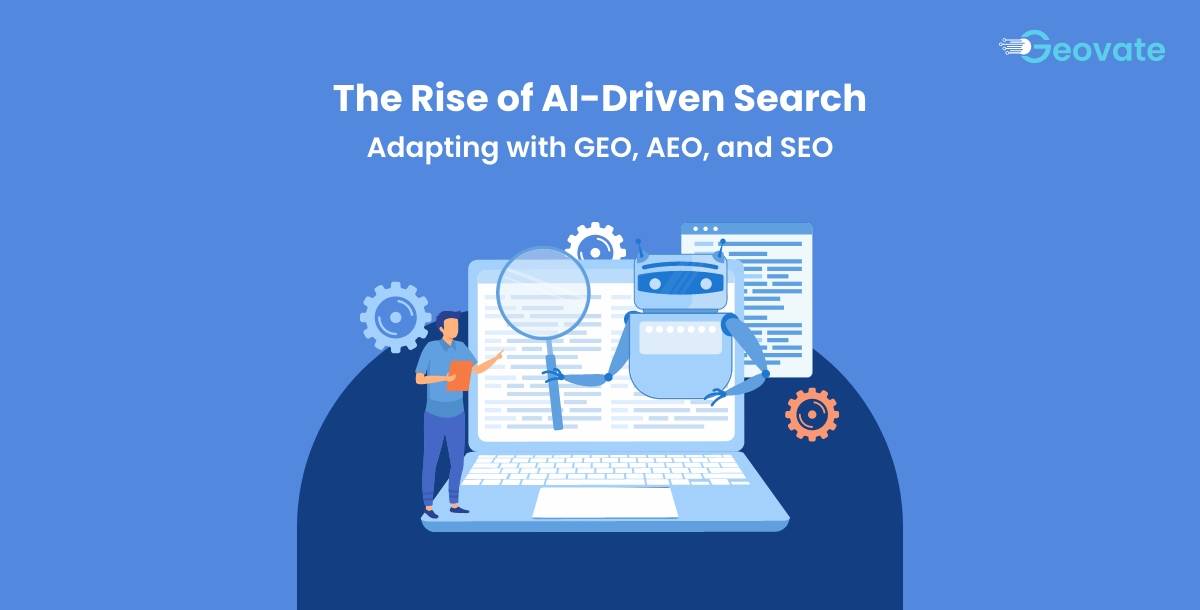The Rise of AI-Driven Search: Adapting with GEO, AEO, and SEO
Thu,17 Jul 2025 12:53:00- Font Size
- Share Content

In a rapidly evolving digital world, the future of online visibility is no longer ruled by traditional SEO alone. With answer engines and generative AI transforming search behavior, the landscape now requires a hybrid strategy involving SEO (Search Engine Optimization), AEO (Answer Engine Optimization), and GEO (Generative Engine Optimization). This blog explores how brands can adapt and thrive using cutting-edge strategies powered by Geovate.
What Is the Difference Between SEO, AEO, and GEO?
SEO focuses on ranking websites in traditional search engines, AEO is designed to give direct answers in answer engines, and GEO optimizes content for AI-powered generative engines. Each plays a distinct role in modern digital visibility and content discoverability.
Search Engine Optimization (SEO) is the most established of the three. It’s centered around improving a website’s position in search engine results pages (SERPs) by targeting keywords, earning backlinks, optimizing site speed and structure, and adhering to technical best practices. SEO’s strength lies in attracting organic traffic from platforms like Google and Bing through keyword relevance and domain authority. However, it often relies on users clicking through to read the content.
Answer Engine Optimization (AEO) emerged as voice search and AI assistants like Siri, Alexa, and Google Assistant became popular. AEO focuses on providing precise, structured, and concise answers that can be directly pulled and read aloud or shown in answer boxes. It emphasizes semantic search, structured data, and conversational content that allows AI systems to understand context and deliver responses instantly, often without requiring users to visit the website.
Generative Engine Optimization (GEO) is the newest frontier, optimized for AI systems such as ChatGPT, Gemini, and Claude, which don’t rely on a search index but instead generate answers using trained models. GEO ensures your content is not only found by generative AI but also cited or used within its outputs. This involves creating high-quality, semantically rich, and modular content that can be understood, remembered, and replicated by LLMs. It requires a hybrid approach—balancing human readability with machine interpretability—so content is favored during the training and generation phases of AI interaction.
Together, SEO, AEO, and GEO cover the full spectrum of modern digital discovery, from traditional searches to AI-powered conversations.
Why Is Generative Engine Optimization(GEO) So Important in 2025?
Because generative engines are becoming the new front door to the internet, brands that ignore GEO risk disappearing from these discovery funnels. Generative AI models are not constrained by web crawling—they learn and generate from vast content inputs.
That means:
- Your content needs to be contextually rich and semantically structured.
- Citations and factual accuracy matter more than ever.
- You must write content that AI tools can understand and reuse in conversations, not just rank.
A brand without a GEO strategy is a brand that will soon be digitally invisible.
How Does GEO Complement SEO and AEO?
GEO works in synergy with SEO and AEO to form a triad of visibility—helping your content perform across search engines, answer engines, and AI chat interfaces.
- While SEO boosts ranking, it doesn't guarantee being cited by AI agents.
- AEO increases your chances of being featured as a direct answer—but it’s often short-form.
- GEO ensures your long-form, structured, and rich content gets picked up by AI systems during training, retrieval, and generation.
In essence, GEO fills the gap that SEO and AEO can’t cover alone.
What Are the Core Components of a GEO Strategy?
A successful Generative Engine Optimization(GEO) strategy is built on semantic richness, source reliability, and modular content formats. These components make your content useful to both humans and machines.
Key pillars of GEO include:
1.Structured Content: Use schema markup, FAQs, tables, and bullet lists.
2.Answer-First Formatting: Start with bold answers to match AI training needs.
3.Entity-Rich Language: Include brands, people, tools, stats, and locations.
4.Contextual Interlinking: Build internal and external links across related entities.
5.Machine-Readable Sources: Avoid multimedia-only content—textual content is king for LLMs.
How Can Businesses Implement GEO Without Losing SEO Gains?
The good news is, GEO doesn't replace SEO—it upgrades it. You can implement GEO without undoing years of SEO progress.
Here’s how:
- Add answer-first intros under every H2 or H3 tag.
- Include FAQs at the end of every article with clear markup.
- Use markdown, semantic HTML, and natural language structure in your content.
- Invest in tools that audit content for both search engine and generative engine friendliness.
The goal isn’t to choose between SEO and GEO—it’s to do both, smartly.
Which Industries Benefit Most from GEO?
Industries relying on high informational searches—like finance, health, legal, tech, education, and e-commerce—stand to gain massively from GEO.
Any niche where users ask nuanced questions that require expert answers will benefit from being featured in LLM responses. Think:
- Healthcare companies answering condition-specific questions.
- SaaS companies explaining workflows.
- Fintechs offering investment comparisons.
- Universities delivering program breakdowns.
GEO puts your content in front of users even when they don’t visit your website.
What Tools Can Help With Generative Engine Optimization(GEO)?
There are now specialized Generative Engine Optimization(GEO) Tools designed to evaluate, refine, and structure content for AI readiness. These include both manual and automated systems.
Some GEO Tools include:
- Geovate’s Content Discovery Matrix – helps identify what AI agents are citing.
- Perplexity Query Analyzer – reveals query trends and model outputs.
- ChatGPT and Claude Simulations – to test if your content appears or is used.
- Schema.org Markup Validators – ensures structured data compliance.
As a top-tier Generative Engine Optimization(GEO) Agency, Geovate integrates these tools into a unified platform for GEO success.
How Is GEO Measured? Are There Metrics?
GEO isn’t measured in pageviews—it's tracked by citations in AI outputs, visibility in LLM-generated content, and prompt inclusion.
GEO metrics include:
- Frequency of being cited in AI tools like Perplexity or ChatGPT.
- Prompt tests: Does your brand come up in GPT-style search tasks?
- Entity recognition score: How often and accurately your brand or topic is referenced.
- Inbound links from AI-based articles or summaries.
Geovate offers a full Generative Engine Optimization(GEO) Services Providers suite with GEO-specific dashboards.
What Content Formats Work Best for GEO?
Long-form, semantically rich, and structurally modular content performs best for generative engine visibility. Avoid fluff, optimize for clarity, and structure for machine readability.
Best content types:
- How-to guides and tutorials with steps.
- Listicles with numbered items.
- Case studies and use cases.
- Expert interviews.
- Frequently Asked Questions (FAQs) and glossary pages.
These formats make your content ideal fodder for LLMs.
What Are the Risks of Ignoring GEO?
Failing to adopt GEO could make your brand invisible to the fastest-growing discovery engines—AI chatbots and voice assistants. You may rank on Google, but never get mentioned in AI search.
That means:
- Lower traffic from answer tools.
- Missed conversions from AI-based recommendations.
- Less brand recall in zero-click environments.
- Being outranked by competitors with GEO-optimized content.
Don’t let your brand become digitally obsolete.
Who Should Handle GEO Strategy—In-House or an Agency?
If you're not an AI or content strategy expert, partnering with a specialized Generative Engine Optimization(GEO) company like Geovate is your best bet.
An in-house team might handle basic optimizations, but GEO requires:
- Deep understanding of LLMs and their training behavior.
- Structured content production workflows.
- Regular prompt testing and citation audits.
- Up-to-date tooling and AI insights.
A Generative Engine Optimization(GEO) Agency brings all this under one roof.
How Does GEO Impact Voice Search and Conversational AI?
Voice assistants and chatbots rely on generative models, making GEO a foundational strategy for voice search success.
GEO ensures your content is:
- Short enough to be spoken aloud.
- Factually accurate and cited.
- Written in natural, conversational tone.
As conversational interfaces dominate smart homes, cars, and devices, GEO is the bridge between your brand and verbal interactions.
Can GEO Be Applied to Local SEO or Small Businesses?
Absolutely. GEO is scalable—even small businesses can use it to appear in localized AI results.
Tactics include:
- Local entity markup (business name, location, hours).
- FAQs about local services.
- Regional keyword clustering.
- Inclusion in niche directories referenced by LLMs.
Geovate offers GEO playbooks for both global enterprises and neighborhood businesses.
FAQs
Q1. What is Generative Engine Optimization (GEO)?
A. GEO is the practice of optimizing content for discovery and citation by generative AI systems like ChatGPT, Gemini, or Claude. It ensures your content appears in LLM-generated results, not just search engines.
Q2. How is GEO different from SEO and AEO?
A. SEO targets search engines, AEO targets answer engines, while GEO targets generative models. Each serves a different visibility layer in the evolving search ecosystem.
Q3. Are there Generative Engine Optimization(GEO) Services Providers?
A. Yes, firms like Geovate are leading Generative Engine Optimization(GEO) Services Providers. They offer audits, content upgrades, prompt testing, and dashboard tracking.
Q4. Do GEO tools really work?
A. Yes. Generative Engine Optimization(GEO) Tools help identify visibility gaps, optimize formats, and simulate LLM responses. They're essential for staying ahead in 2025 and beyond.
Q5. Should I use a Generative Engine Optimization(GEO) Agency?
A. If you’re serious about digital dominance in the age of AI, a Generative Engine Optimization(GEO) Agency is crucial. Agencies bring expertise, tooling, and strategic insights that are hard to replicate in-house.
